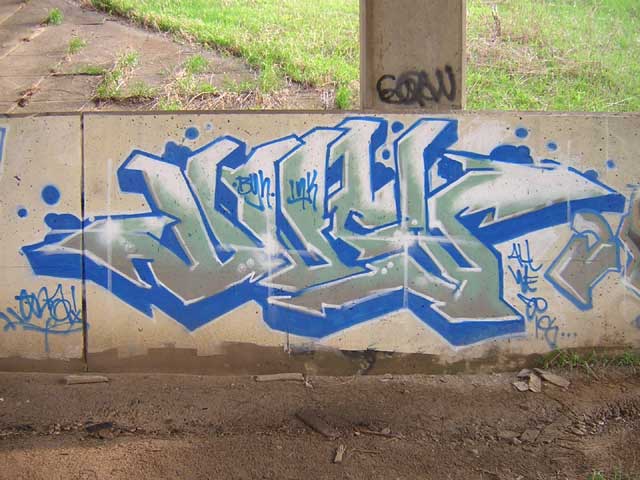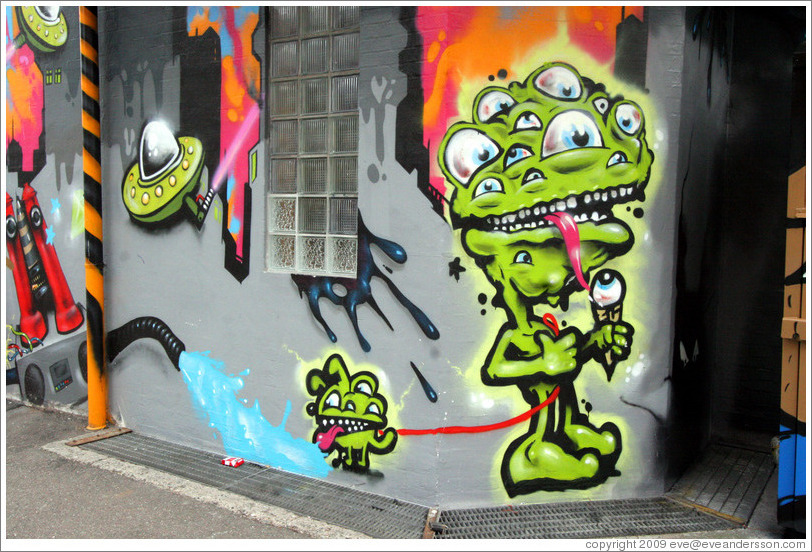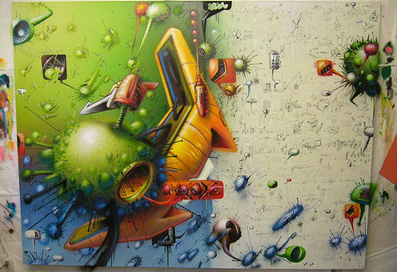In America around the late 1960s, graffiti was used as a form of expression by political activists, and also by gangs like the Savage Skulls, La Familia, and Savage Nomads to mark territory. In the late 1960s, signs of graffiti writers tag corn bread Philadelphia, Cool Earl and Topcat 126 began to appear. Cornbread is often cited as one of the first authors of modern graffiti. Around 1970-71, innovation center Graffiti moved to New York City in which the author followed Taki 183 and Tracy 168 would add their street number, their nickname of "bomb" a train with their work, and let now take the subway and reputation, that is impressive, or simply pervasive, enough "All City". Bubble letters originally held the power of writers from the Bronx, although complex 168 Tracy wrote called "Wild Style" will come to define art. Trendsetters Early joined in the 70s by artists like Dondi, Zephyr and Lady Pink.

Graffiti is one of four main elements of hip-hop culture (with a sudden, DJing, and breakdancing). The relationship between graffiti and hip-hop culture emerged in the early graffiti artists practicing other aspects of hip-hop, and practiced in the region - areas where other elements of hip-hop has evolved as a form Art. In the mid-eighties, the form will move from the street art world. Jean-Michel Basquiat left SAMO tag for its art galleries, street art and even connect to hip-hop would loosen. Occasional hip hop paeans to graffiti is still heard throughout the nineties, however, on tracks like "Wrong Side of Da Tracks artifacts" and Company Flow Lune TNS ".
 Graffiti is one of four main elements of hip-hop culture (with a sudden, DJing, and breakdancing). The relationship between graffiti and hip-hop culture emerged in the early graffiti artists practicing other aspects of hip-hop, and practiced in the region - areas where other elements of hip-hop has evolved as a form Art. In the mid-eighties, the form will move from the street art world. Jean-Michel Basquiat left SAMO tag for its art galleries, street art and even connect to hip-hop would loosen. Occasional hip hop paeans to graffiti is still heard throughout the nineties, however, on tracks like "Wrong Side of Da Tracks artifacts" and Company Flow Lune TNS ".
Graffiti is one of four main elements of hip-hop culture (with a sudden, DJing, and breakdancing). The relationship between graffiti and hip-hop culture emerged in the early graffiti artists practicing other aspects of hip-hop, and practiced in the region - areas where other elements of hip-hop has evolved as a form Art. In the mid-eighties, the form will move from the street art world. Jean-Michel Basquiat left SAMO tag for its art galleries, street art and even connect to hip-hop would loosen. Occasional hip hop paeans to graffiti is still heard throughout the nineties, however, on tracks like "Wrong Side of Da Tracks artifacts" and Company Flow Lune TNS ". Graffiti is one of four main elements of hip-hop culture (with a sudden, DJing, and breakdancing). The relationship between graffiti and hip-hop culture emerged in the early graffiti artists practicing other aspects of hip-hop, and practiced in the region - areas where other elements of hip-hop has evolved as a form Art. In the mid-eighties, the form will move from the street art world. Jean-Michel Basquiat left SAMO tag for its art galleries, street art and even connect to hip-hop would loosen. Occasional hip hop paeans to graffiti is still heard throughout the nineties, however, on tracks like "Wrong Side of Da Tracks artifacts" and Company Flow Lune TNS ".
Graffiti is one of four main elements of hip-hop culture (with a sudden, DJing, and breakdancing). The relationship between graffiti and hip-hop culture emerged in the early graffiti artists practicing other aspects of hip-hop, and practiced in the region - areas where other elements of hip-hop has evolved as a form Art. In the mid-eighties, the form will move from the street art world. Jean-Michel Basquiat left SAMO tag for its art galleries, street art and even connect to hip-hop would loosen. Occasional hip hop paeans to graffiti is still heard throughout the nineties, however, on tracks like "Wrong Side of Da Tracks artifacts" and Company Flow Lune TNS ".
 Graffiti is one of four main elements of hip-hop culture (with a sudden, DJing, and breakdancing). The relationship between graffiti and hip-hop culture emerged in the early graffiti artists practicing other aspects of hip-hop, and practiced in the region - areas where other elements of hip-hop has evolved as a form Art. In the mid-eighties, the form will move from the street art world. Jean-Michel Basquiat left SAMO tag for its art galleries, street art and even connect to hip-hop would loosen. Occasional hip hop paeans to graffiti is still heard throughout the nineties, however, on tracks like "Wrong Side of Da Tracks artifacts" and Company Flow Lune TNS ".
Graffiti is one of four main elements of hip-hop culture (with a sudden, DJing, and breakdancing). The relationship between graffiti and hip-hop culture emerged in the early graffiti artists practicing other aspects of hip-hop, and practiced in the region - areas where other elements of hip-hop has evolved as a form Art. In the mid-eighties, the form will move from the street art world. Jean-Michel Basquiat left SAMO tag for its art galleries, street art and even connect to hip-hop would loosen. Occasional hip hop paeans to graffiti is still heard throughout the nineties, however, on tracks like "Wrong Side of Da Tracks artifacts" and Company Flow Lune TNS ".













